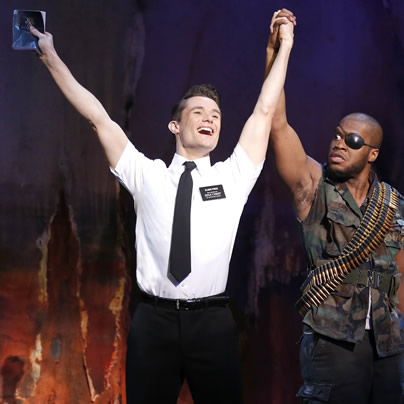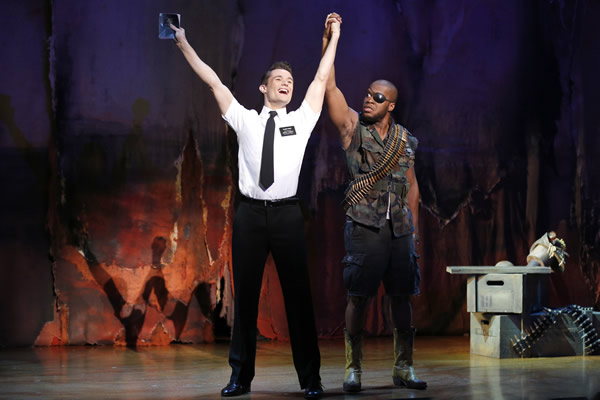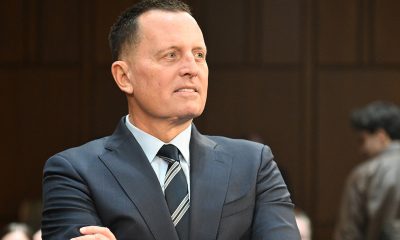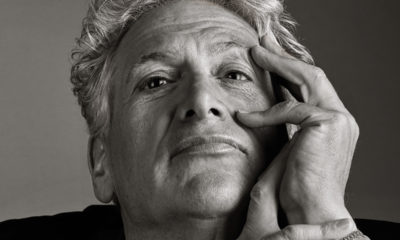Arts & Entertainment
Missionary man
Mormon-skewering Broadway hit at Kennedy Center


Mark Evans, left, and Derrick Williams in ‘The Book of Mormon.’ (Photo by Joan Marcus; courtesy Kennedy Center)
‘The Book of Mormon’
Through Aug. 18
The Kennedy Center for the Performing Arts
$43-$250
kennedy-center.org
You’ve seen them. Those squeaky clean Mormon boys on their post-high school mission, indefatigably going door to door pushing the Latter Day message.
Dressed in their white shirts, black ties and pants, they look lifted from the Eisenhower era. “The Book of Mormon,” the Broadway favorite from “South Park” creators Trey Parker and Matt Stone and “Avenue Q” co-creator Robert Lop, hilariously trades on this iconic image so ripe for lampooning. And now the first national tour of the delectably irreverent musical is parked at the Kennedy Center through late August. Tickets have been in extremely high demand.
The action kicks off in Salt Lake City (imagined here as a flat, pretty colored picture map) with a passel of eager young Mormons honing their proselytizing skills in the very funny opening number “Hello.” Next the young men are paired off and assigned their mission destinations. Mormon poster boy Elder Price (Mark Evans) is matched with unlikely counterpart Elder Cunningham (Christopher John O’Neill). With his perfect hair and no-nonsense demeanor, Price is an admired over achiever; while Cunningham who’s never been able to slog through the Book of Mormon is rumpled and desperate for a friend. Together they’re sent to a remote Ugandan village (Price was hoping for Orlando, Fla.).
In Uganda, Scott Pask’s set morphs into a darker world of ominous skies and broken down huts. A villager casually crosses the stage dragging a life size, bloody donkey carcass. After presenting themselves to some of the leading natives, Price and Cunningham join a group of other young missionaries stationed in the village. They learn that things aren’t going too well, religious conversions aren’t happening. It seems that the understandably jaded local population, tired from dealing with AIDS, forced female genital mutilation and a threatening violent warlord, has little time for far out Bible stories.
Undaunted, Price is determined to do something incredible. But surprisingly, it’s less-than-promising Cunningham, not Price, who connects with the native population. He strikes up a romance with local girl Nabulungi (the sweet and sexy Samantha Marie Ware), and with her help, peddles a watered down version of Mormonism filled with references from his favorite science fiction and fantasy films, and wins loads of converts.
With the creators of “South Park,” nothing is sacred. In the second act’s “Spooky Mormon Hell Dream,” Price sees his father having hot sex with serial killer Jeffrey Dahmer. Then there’s casual talk of raping babies as a cure for AIDS. One villager routinely complains, “I have maggots in my scrotum.” Yes, it’s a little offensive and very foulmouthed, but it’s also big-hearted and admirably executed.
As Price, sterling-voiced Evans gives a nuanced performance, ably conveying his character’s big ego as well as his decency and likeability. Evans’ stirring rendition of “I Believe” is one of the show’s more memorable moments. And though not as musically blessed as Evans, O’Neill (making his professional debut as Cunningham) oozes comic ability.
Smartly, the show’s creators use musical theater elements including heartrending ballads and big song and dance numbers (delightfully choreographed by co-director Casey Nicholaw) to poke fun. Grey Henson is terrific as the closeted Elder McKinley who likes to think that suppressing his gayness is as simple as turning off a light switch. He and the other Mormons sing about it in a fabulous tap-filled number titled “Turn it Off.”
With “The Guardsman” and “Anything Goes,” the Kennedy Center has been on a roll. And now with “The Book of Mormon,” that winning streak continues for the big boxy landmark on the Potomac.
Theater
‘Bad Books’ a timely look at censorship in local library
Influencer vs. conservative parent in Round House production

‘Bad Books’
Through May 4
Round House Theatre
4545 East-West Highway
Bethesda, Md.
Tickets start at $43
Roundhousetheatre.org
While a library might seem an unlikely place for a heated contretemps, it’s exactly the spot where adults go when they’re itching to battle out what books minors might be allowed to read.
In Sharyn Rothstein’s “Bad Books,” two women, The Mother (out actor Holly Twyford) and The Librarian (Kate Eastwood Norris), swiftly become mired in a quarrel that comes with some weighty repercussions.
The Mother is a popular conservative influencer on a mission. She’s furious that the local library has overstepped its bounds and she blames The Librarian, a woman who adheres to the “it takes a village” method of child rearing and is dedicated to the young people who approach her reference desk.
There’s some background. It seems The Librarian who dresses young (tight jackets and Doc Martens) and curses a blue streak, forged a friendship with Jeremy, a teenage library regular.
While the details are a bit hazy, it seems the troubled Jeremy confided in The Librarian regarding some personal issues. In return, she suggested a helpful book – Boob Juice.
Unsurprisingly, based solely on its title, the book has thrown The Mother into a pique of outrage. After finding Boob Juice in her son’s bedroom, she made a beeline to the library; and not incidentally, The Mother hasn’t read the recommended work and has no plans to do so.
Set in a suburb with lax gun laws, the story explores facets of division and conciliation. The Mother insists she isn’t so much about banning books as she is keeping some books away from young people until they’ve obtained parental approval.
“Bad Books” is performed in the round. Built on a rotating stage, Meghan Raham’s set is simple, pleasingly serviceable, and easily transforms from the library into a small corporate office, and later the assembly room of a church. Overhead floats a circular glass shelf filled with a cache of banned books. Things like a rolling book cart and a goldfish bowl add some flavor to the different locations.
The Mother wasn’t always a popular conservative warrior with an enthusiastic horde of followers.
Her past includes penning a book that later filled her with guilt and regret. She refers to that early questionable literary accomplishment as her bad book. And while over the years, she has persevered to find and destroy each and every printed copy, she hasn’t entirely succeeded.
Norris plays three women who figure meaningfully into the arc of Twyford’s mother character. In addition to The Librarian, Norris is The Manager, a broadly played piece of comic relief, and The Editor, a warm woman who reveals things about Jeremy that his own mother never knew.
Smartly staged by Ryan Rilette, the production is part of a National New Play Network Rolling World Premiere. While Rothstein’s script offers two strong roles (skillfully performed by celebrated actors Twyford and Norris), its ending feels too neatly resolved.
In the past, Twyford and Norris have successfully joined forces for numerous DMV productions including Studio Theatre’s production of David Auburn’s two-hander “Summer, 1976,” the story of a longtime and unlikely friendship between two women who meet as young mothers during the Bicentennial summer.
Though different, both The Librarian and The Mother share a strong and ultimately hopeful relationship with words.
There’s a quote from E.B. White’s classic “Charlotte’s Web” that pops up a couple of times in the briskly paced 80-minute play. Charlotte, the wise spider, says, “with just the right words you can change the world.”
Books
‘Pronoun Trouble’ reminds us that punctuation matters
‘They’ has been a shape-shifter for more than 700 years

‘Pronoun Trouble’
By John McWhorter
c.2025, Avery
$28/240 pages
Punctuation matters.
It’s tempting to skip a period at the end of a sentence Tempting to overuse exclamation points!!! very tempting to MeSs with capital letters. Dont use apostrophes. Ask a question and ignore the proper punctuation commas or question marks because seriously who cares. So guess what? Someone does, punctuation really matters, and as you’ll see in “Pronoun Trouble” by John McWhorter, so do other parts of our language.

Conversation is an odd thing. It’s spontaneous, it ebbs and flows, and it’s often inferred. Take, for instance, if you talk about him. Chances are, everyone in the conversation knows who him is. Or he. That guy there.
That’s the handy part about pronouns. Says McWhorter, pronouns “function as shorthand” for whomever we’re discussing or referring to. They’re “part of our hardwiring,” they’re found in all languages, and they’ve been around for centuries.
And, yes, pronouns are fluid.
For example, there’s the first-person pronoun, I as in me and there we go again. The singular I solely affects what comes afterward. You say “he-she IS,” and “they-you ARE” but I am. From “Black English,” I has also morphed into the perfectly acceptable Ima, shorthand for “I am going to.” Mind blown.
If you love Shakespeare, you may’ve noticed that he uses both thou and you in his plays. The former was once left to commoners and lower classes, while the latter was for people of high status or less formal situations. From you, we get y’all, yeet, ya, you-uns, and yinz. We also get “you guys,” which may have nothing to do with guys.
We and us are warmer in tone because of the inclusion implied. She is often casually used to imply cars, boats, and – warmly or not – gay men, in certain settings. It “lacks personhood,” and to use it in reference to a human is “barbarity.”
And yes, though it can sometimes be confusing to modern speakers, the singular word “they” has been a “shape-shifter” for more than 700 years.
Your high school English teacher would be proud of you, if you pick up “Pronoun Trouble.” Sadly, though, you might need her again to make sense of big parts of this book: What you’ll find here is a delightful romp through language, but it’s also very erudite.
Author John McWhorter invites readers along to conjugate verbs, and doing so will take you back to ancient literature, on a fascinating journey that’s perfect for word nerds and anyone who loves language. You’ll likely find a bit of controversy here or there on various entries, but you’ll also find humor and pop culture, an explanation for why zie never took off, and assurance that the whole flap over strictly-gendered pronouns is nothing but overblown protestation. Readers who have opinions will like that.
Still, if you just want the pronoun you want, a little between-the-lines looking is necessary here, so beware. “Pronoun Trouble” is perfect for linguists, writers, and those who love to play with words but for most readers, it’s a different kind of book, period.
The Blade may receive commissions from qualifying purchases made via this post.

Friday, April 18
“Center Aging Friday Tea Time” will be at 2 p.m. on Zoom. This is a social hour for older LGBTQ+ adults. Guests are encouraged to bring a beverage of choice. For more details, email [email protected].
Go Gay DC will host “LGBTQ+ Community Social in the City” at 7 p.m. at Hotel Zena. This event is ideal for making new friends, professional networking, idea-sharing, and community building. This event is free and more details are available on Eventbrite.
Trans and Genderqueer Game Night will be at 6 p.m. at the DC Center for the LGBT Community. This will be a relaxing, laid-back evening of games and fun. All are welcome and there’ll be card and board games on hand. Feel free to bring your own games to share. For more details, visit the DC Center’s website.
Saturday, April 19
Go Gay DC will host “LGBTQ+ Community Brunch” at 11 a.m. at Freddie’s Beach Bar & Restaurant. This fun weekly event brings the DMV area LGBTQ+ community, including Allies, together for delicious food and conversation. Attendance is free and more details are available on Eventbrite.
LGBTQ People of Color Support Group will be at 7 p.m. on Zoom. This peer support group is an outlet for LGBTQ People of Color to come together and talk about anything affecting them in a space that strives to be safe and judgement free. There are all sorts of activities like watching movies, poetry events, storytelling, and just hanging out with others. For more information and events for LGBTQ People of Color, visit thedccenter.org/poc or facebook.com/centerpoc.
“Spark Sapphic Social” will be at 8 p.m. at Spark Social House. This weekly sapphic social is an opportunity to mix and mingle with other sapphics in D.C.’s newest LGBTQ bar. This event is free and more details are available on Eventbrite.
“DC Drag Brunch on Rooftop – Penthouse (Formerly at Lima Twist)” will be at 12 p.m. at Baby Shank Rooftop. Hosted by Miss Capital Pride, this is the ultimate drag brunch experience in Washington, D.C., featuring the fiercest queens around. Prepare to be entertained by glamorous drag queens and celebrated celebrity impersonators, including Taylor Swift, Lady Gaga, Beyoncé, Britney Spears, Nicki Minaj, Ariana Grande, Whitney Houston, Cher and many more. Tickets cost $27 and are available on Eventbrite.
Sunday, April 20
Queer Crayon Club will host “Queer Sketch Social” at 3 p.m. at Sinners and Saints. This is a fun event for LGBTQ+ adults to come together and color. Attendance is free and more details are available on Eventbrite.
Monday, April 21
“Center Aging Monday Coffee & Conversation” will be at 10 a.m. on Zoom. This is a social hour for older LGBTQ+ adults. Guests are encouraged to bring a beverage of choice. For more details, email [email protected].
Tuesday, April 22
Genderqueer DC will be at 7 p.m. on Zoom. This support group is for people who identify outside of the gender binary. Whether you’re bigender, agender, genderfluid, or just know that you’re not 100% cis – this is your group. For more details, visit www.genderqueerdc.org or Facebook.
Coming Out Discussion Group will be at 7 p.m. on Zoom. This is a peer-facilitated discussion group and a safe space to share experiences about coming out and discuss topics as it relates to doing so. For more details, visit the group’s Facebook.
Wednesday, April 23
Job Club will be at 6 p.m. on Zoom. This is a weekly job support program to help job entrants and seekers, including the long-term unemployed, improve self-confidence, motivation, resilience and productivity for effective job searches and networking — allowing participants to move away from being merely “applicants” toward being “candidates.” For more information, email [email protected] or visit thedccenter.org/careers.
Asexual and Aromantic Discussion Group will be at 7 p.m. on Zoom. This is a space where people who are questioning this aspect of their identity or those who identify as asexual and/or aromantic can come together, share stories and experiences, and discuss various topics. For more details, email [email protected].
Thursday, April 24
Virtual Yoga with Sarah M. will be at 7 p.m. on Zoom. This is a free weekly class focusing on yoga, breath work, and meditation. For more details, visit the DC Center for the LGBT Community’s website.
DC Anti-Violence Project Open Meeting will be at 7 p.m. on Zoom. This meeting is open to anyone interested in learning more and getting involved in lessening violence both within and directed towards the LGBT communities. For more information, visit Facebook or Twitter.
-

 State Department4 days ago
State Department4 days agoHIV/AIDS activists protest at State Department, demand full PEPFAR funding restoration
-

 Brazil4 days ago
Brazil4 days agoUS lists transgender Brazilian congresswoman’s gender as ‘male’ on visa
-

 District of Columbia4 days ago
District of Columbia4 days agoCapital Pride wins $900,000 D.C. grant to support WorldPride
-

 Mexico3 days ago
Mexico3 days agoGay couple claims Puerto Vallarta wedding venue discriminated against them












